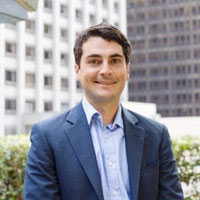Financial technology (fintech) continues to change the dynamics of banking and how financial products and services are delivered to consumers. At the SF Fed, we’re analyzing fintech innovations and their impacts on financial institution supervision, community development, financial stability, payments, and other areas. Our goal is simple: to help facilitate responsible innovations while protecting consumers and ensuring the safety and soundness of banks. SF Fed fintech team are available to help answer questions from fintech companies and banks to build an understanding of the financial regulatory environment so innovative ideas thrive.
Our Team

Sean Creehan is lead for financial health, inclusion, and technology. Before joining the Fed, Sean worked as a management consultant to clients investing in Asia. He holds a master’s in international economics from Johns Hopkins School of Advanced International Studies and a bachelor’s in social studies from Harvard College. He spent a postgraduate year as a Harvard-Yenching Scholar at Peking University, and speaks Mandarin Chinese and Indonesian. In addition, he is a Chartered Financial Analyst (CFA) and a term member of the Council on Foreign Relations.

Erin English covers cryptocurrencies, digital assets and blockchain technology risk for the Fintech team. Prior to joining the Fed, he was part of Visa’s Global Policy team and a founding fellow of the Visa Economic Empowerment Institute, and prior to Visa was a member of Microsoft’s Trustworthy Computing public policy team. Erin previously served for the better part of a decade in the U.S. Department of Treasury in the Office of Terrorism and Financial Intelligence, and as the Department’s Financial Attaché in Pakistan during the global financial crisis. Erin holds a master’s degree from the Fletcher School of Law and Diplomacy at Tufts University and a bachelor’s degree in history from the U.S. Military Academy at West Point.

Julia Godinez covers bank/fintech partnerships and Artificial Intelligence/Machine Learning (AI/ML) risk. Additionally, she is on a Federal Reserve System working group that identifies emerging fintech risk. Prior to joining the SF Fed, Julia was a Large Institution Lead Examiner at the Federal Reserve Bank of New York, and she served in the Peace Corps in Guatemala. Julia holds an MPA in economic and financial policy from Cornell University, and a bachelor’s degree Economics and History from Mount Holyoke College and speaks Spanish and Portuguese.

Cindy Li covers digital banking and lending. In addition, she manages the Supervision + Credit Group’s country analysis function and Asia Program. Prior to joining the Fed, Cindy was a senior economist at the Milken Institute, where she led research projects on global capital market trends and U.S. banking regulation. Cindy has a PhD in economics from UC Riverside and a BA in international finance from Peking University in China. She also holds the designation of Chartered Financial Analyst (CFA). Cindy is a recipient of the Federal Reserve Bank of San Francisco’s Legacy Award for Leadership.

Linda True covers digital banking and lending and is the Asia Program coordinator. Previously, Linda worked on international trade issues and trade remedy cases as a senior analyst at White & Case/Weerawong CP in Bangkok, as an associate at Wachovia Bank on KYC compliance in D.C., and as an assistant auditor at Pricewaterhouse Coopers in Bangkok. She holds a master’s degree in international relations from Johns Hopkins University’s School of Advanced International Studies, and a bachelor’s degree in accounting from Thammasat University. She is also a graduate from the Pacific Coast Banking School.
Program Executive Sponsors

Tom Cunningham
Group Vice President
Tom Cunningham is a group vice president in the SF Fed’s Supervision + Credit Group. He oversees the Strategy & Advisory group, which focuses on evaluating risks that could potentially have an impact on our supervision programs and the corresponding financial planning and investments required to address those risks, along with ensuring appropriate resources and knowledge sharing required to help us prepare for the future of supervision.